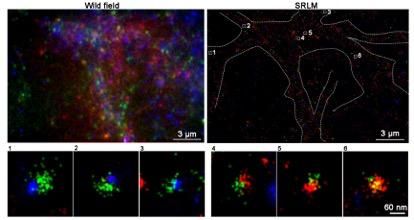Enzyme tests with peptide chips and mass spectrometry
Advertisement
cell division, differentiation, programmed cell death-there isn't a single essential cellular process for which protein kinases, enzymes that attach phosphate groups to proteins, haven't assumed important regulatory functions. Knowledge about the activities of the various members of this class of enzymes are correspondingly important for biomedical and pharmacological research. A team at the University of Chicago has now developed a new mass-spectrometric chip process for the fast, uncomplicated, and-most importantly-simultaneous determination of kinase activities.
What is needed for an enzyme test is a suitable substrate; in this case, a protein fragment (peptide), to which the kinase in question is able to attach a phosphate. The research team headed by Milan Mrksich fixed such peptides to the surfaces of chips-gold-coated glass plates onto which a layer of organic molecules is deposited. A section of these molecules acts as a molecular anchoring site for peptides.
When a drop of test solution is put on the peptide chip, any kinases it contains recognize their substrate, pounce on it, and attach a phosphate group to each substrate molecule. Peptides with phosphates are heavier than those without, and this weight difference can be detected by a special mass-spectrometric technique called MALDI-TOF.
A laser beam is used to "shoot" individual molecules on the surface of the chip, ionizing them (giving them an electric charge). The charged particles are then accelerated toward a detector in an electric field. Heavier molecules are slower than light ones, so the time required to reach the detector allows the researchers to determine the molecular mass. The mass spectrum of the chip then shows a signal for the peptide, with or without its phosphate.
If peptides that have different molecular weights and which serve as substrates for a single type of kinase are anchored onto the same chip, the activities of several kinases can be ascertained in a single experiment-a particular advantage of this method.
The effectiveness of kinase inhibitors, which may be under consideration as medications, can also be quantified. For this, a series of experiments is carried out in the presence of the kinases and different inhibitor concentrations. The ratios of the signals for peptide with and without phosphate reveal the dosage-effectiveness relationship for the inhibitor.
Other news from the department science
Most read news
More news from our other portals
See the theme worlds for related content
Topic World Mass Spectrometry
Mass spectrometry enables us to detect and identify molecules and reveal their structure. Whether in chemistry, biochemistry or forensics - mass spectrometry opens up unexpected insights into the composition of our world. Immerse yourself in the fascinating world of mass spectrometry!

Topic World Mass Spectrometry
Mass spectrometry enables us to detect and identify molecules and reveal their structure. Whether in chemistry, biochemistry or forensics - mass spectrometry opens up unexpected insights into the composition of our world. Immerse yourself in the fascinating world of mass spectrometry!

























































